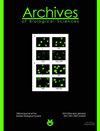塞尔维亚阿尔茨海默氏痴呆症人群中载脂蛋白ε4等位基因的关联
IF 0.8
4区 生物学
Q4 BIOLOGY
引用次数: 0
摘要
虽然载脂蛋白E基因(APOE)的单核苷酸多态性rs429358和rs7412被广泛研究以分析APOE等位基因,但没有数据表明它们与阿尔茨海默病?在塞尔维亚人的老年痴呆症(AD)。本研究旨在探讨APOE ?2/?3/?的分布。4等位基因在阿尔茨海默病患者和认知功能未受损的受试者中,并评估APOE ?4等位基因与塞尔维亚人群疾病风险的关系。一项病例对照研究包括因阿尔茨海默病而痴呆的患者和认知功能未受损的个体。采用Real-Time PCR方法对APOE rs429358和rs7412进行等位基因特异性TaqMan检测,随后对APOE ?2/?3/?4等位基因载体状态分析。患者携带APOE ?4等位基因的频率明显高于对照组(P<0.001)。APOE - 4等位基因与AD痴呆的风险比参考等位基因高3倍(P<0.001)。总之,这是第一个表明APOE - 4等位基因携带者比APOE - 3等位基因携带者在塞尔维亚人群中患阿尔茨海默病痴呆的风险更高的研究。本文章由计算机程序翻译,如有差异,请以英文原文为准。
Association of the apolipoprotein E ε4 allele in a Serbian population with Alzheimer’s dementia
Although single nucleotide polymorphisms rs429358 and rs7412 in the apolipoprotein E gene (APOE) are widely investigated to analyze APOE alleles, there are no data on their association with Alzheimer?s disease (AD) dementia in a Serbian population. This study aimed to investigate the distribution of APOE ?2/?3/?4 alleles in patients with dementia due to AD and cognitively unimpaired subjects and to assess the association of the APOE ?4 allele with disease risk in the Serbian population. A case-control study included patients with dementia due to AD and cognitively unimpaired individuals. APOE rs429358 and rs7412 were analyzed using the Real-Time PCR method with allelespecific TaqMan assays, followed by APOE ?2/?3/?4 allele carrier status analysis. Patients had a significantly higher frequency of the APOE ?4 allele than the control group (P<0.001). The APOE ?4 allele was found to be associated with a 3-fold higher risk of AD dementia compared to the reference ?3 allele (P<0.001). In conclusion, this is the first study to suggest that carriers of the APOE ?4 allele have a higher risk of developing dementia due to AD than those who carry the APOE ?3 allele in the Serbian population.
求助全文
通过发布文献求助,成功后即可免费获取论文全文。
去求助
来源期刊
CiteScore
1.40
自引率
0.00%
发文量
25
审稿时长
3-8 weeks
期刊介绍:
The Archives of Biological Sciences is a multidisciplinary journal that covers original research in a wide range of subjects in life science, including biology, ecology, human biology and biomedical research.
The Archives of Biological Sciences features articles in genetics, botany and zoology (including higher and lower terrestrial and aquatic plants and animals, prokaryote biology, algology, mycology, entomology, etc.); biological systematics; evolution; biochemistry, molecular and cell biology, including all aspects of normal cell functioning, from embryonic to differentiated tissues and in different pathological states; physiology, including chronobiology, thermal biology, cryobiology; radiobiology; neurobiology; immunology, including human immunology; human biology, including the biological basis of specific human pathologies and disease management.

 求助内容:
求助内容: 应助结果提醒方式:
应助结果提醒方式:


